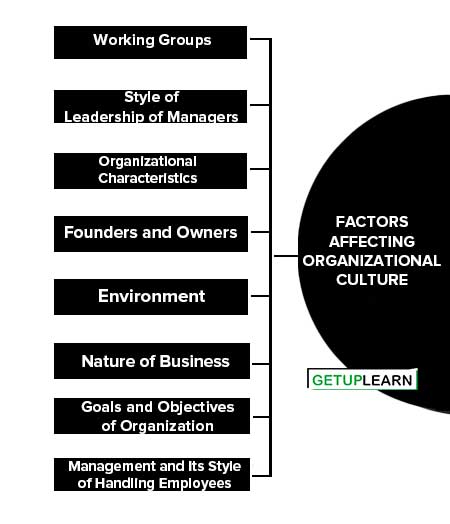Organizational culture is the shared values, beliefs, assumptions, and norms that shape the behavior and functioning of an organization. It plays a vital role in influencing the work environment, employee behavior, decision-making processes, and overall organizational success.
Table of Contents
Factors Affecting Organizational Culture
These are the serval factors affecting organizational culture:
- Working Groups
- Style of Leadership of Managers
- Organizational Characteristics
- Founders and Owners
- Environment
- Nature of Business
- Goals and Objectives of Organization
- Management and Its Style of Handling Employees

Working Groups
Working groups take various forms within organizations. They are established through formal authority as the organizations function as networks of such groups. The group’s formation is influenced by personal characteristics (personality, experience, training, and attitudes) and situational variables (tasks, available space, and the way awards are granted either to the group or individuals).
Groups emerge due to the need for affiliation, goal achievement, physical proximity, and compatibility of personalities and values. The group’s nature and size impact perceptions of the organizational culture. Each employee’s beliefs, attitudes, and behaviors contribute to the organizational culture.
The group’s mission significantly influences cultural perceptions. Internal relationships play a crucial role in shaping the organization’s culture. Attitudes towards risk, communication patterns, and conflict handling have a substantial impact on the working group, as well as on innovation and creativity within the organization. Based on these factors, employees develop an impression of “what kind of workplace it is.”
Style of Leadership of Managers
This has a considerable effect on the culture of a group. If the manager is distant towards his/her subordinates, this attitude can have a negative impact on the culture. The trust in the manager, the embodiment of the chief in a positive example can influence favorably the efficacy of the group.
The managers always influence, substantially, the organizational culture, their influence being proportional to the hierarchical level. At the same hierarchical level, the influence differs from one manager to another, because the level of training and the leadership style are not the same.
Organizational Characteristics
Organizational characteristics significantly impact culture development. Attributes like complexity, size, formalization, and history influence the culture. Larger organizations have higher specialization and impersonal traits, while smaller ones exhibit more homogeneity. Company life cycle and economic situation also play crucial roles in shaping the culture.
Founders and Owners
In many cases, the founders create the philosophy of the company and determine the basic values. The owners of the company can exert their influence from more points of view: of the type of owner (natural and/or juridical persons) and the number of owners. When there are a reduced number of owners, their influence can be more profound.
Environment
The Environment (Juridical, Economic, Cultural, and Technological): The legal environment significantly influences organizational culture, either positively or negatively. A negative impact occurs when contradictory elements are present. The economic environment of a company reflects the national economy’s status, and economic crises also affect the organizational level.
Individuals within a business organization are influenced by values, beliefs, and attitudes from the national culture. Economic culture is derived from the national culture and affects various variables like owners, employees, and managers.
The technology and techniques used, referring to technical capabilities and technologies, also impact organizational culture. Increased technical capabilities may reduce the frequency and intensity of human interactions, shaping the content of the organizational culture accordingly.
Nature of Business
Nature also affects the culture of the organization. Stockbroking industries, financial services, and the banking industry are all dependent on external factors like demand and supply, market cap, earnings per share, and so on.
When the market crashes, these industries have no other option than to terminate the employees which eventually affects the culture of the place. Market fluctuations lead to unrest, and tensions and severely demotivate individuals. The management also feels helpless when circumstances can be controlled by none. Individuals are unsure about their careers as well as their growth in such organizations.
Goals and Objectives of Organization
The strategies and procedures designed to achieve the targets of the organization also contribute to its culture. Individuals working with government organizations adhere to the set guidelines but do not follow a procedure of feedback thus forming its culture. Fast-paced industries like advertising, and event management companies expect employees to be attentive, aggressive, and hyperactive.
Clients and the External Parties: to some extent also affect the work culture of the place. Organizations catering to UK and US Clients have no other option but to work in shifts to match their timings, thus forming the culture.
Management and Its Style of Handling Employees
It affects the culture of the workplace. There are certain organizations where the management allows the employees to take their own decisions and let them participate in strategy making. In such a culture, employees get attached to their management and look forward to a long-term association with the organization.
The management must respect the employees to avoid a culture where the employees just work for money and nothing else. They treat the organization as a mere source of earning money and look for a change in a short span of time.
FAQs Section
What are the factors affecting organizational culture?
The factors affecting organizational culture are:
1. Working Groups
2. Style of Leadership of Managers
3. Organizational Characteristics
4. Founders and Owners
5. Environment
6. Nature of Business
7. Goals and Objectives of Organization
8. Management and Its Style of Handling Employees.
